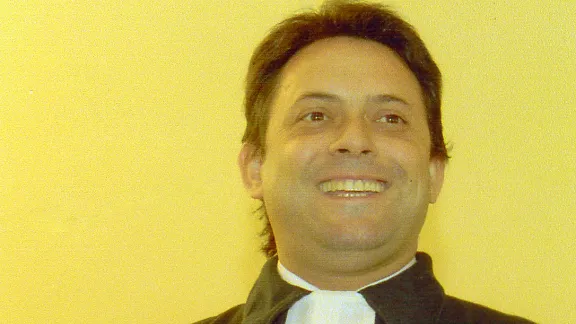
Pfr. Narciso Weiss, IERP-Pfarrer in der Gemeinschaft von General Ramírez, leitete die Kampagne. Foto: IERP
River Plate Church President Welcomes Reformation Day Recognition at Provincial Level
(LWI) – The leader of the Evangelical Church of the River Plate (IERP) in Argentina says the declaration of Reformation Day as a public holiday in Entre Ríos province offers possibility for official recognition of Protestantism as a religion in the Latin American country.
On 5 July the central province of Entre Ríos established 31 October as an annual “Day of Protestant Reform,” following a two-year campaign. Roman Catholicism is the official religion of Argentina, and Judaism and Islam, after much struggle, have been recognized as religions, and their members can rest on the respective day of worship and observe religious holidays.
“[The] recognition is important because for the first time we are being officially recognized as a religion,” said IERP president, Rev. Carlos A. Duarte in the weeks preceding the 31 October Reformation Day celebrations in the province.
“Being a church of the Reformation in our society means having the role of pricking people’s consciences,” he added. “Our desire is simply to be a sign of the Kingdom, that is, of the new heaven and earth, within a community of Jesus Christ in which all are welcome.”
“Given that qualification, I do believe that it means [the IERP ought] to be a prophetic, critical voice in a society deeply marked by injustice and the irresponsible use of renewable and non-renewable natural resources,” he emphasized.
Rev. Narciso Weiss, an IERP pastor who had served in the community of General Ramírez led the campaign to establish Reformation Day in the province. He wanted to draw the attention of his church members and the wider community to the importance of the Protestant Reformation as a religious, political and social movement, and therefore he began to lobby local officials for the day’s recognition.
“And, thanks to the recognition granted [to Reformed Protestantism] in the province of Entre Ríos, there is a possibility of it being extended to other provinces and ultimately to national level,” Duarte added.
Lutheran and Reformed Tradition
The IERP is a denomination of both Lutheran and Reformed traditions which had been known as the German Evangelical Synod of the River Plate. In 1965 the synod approved a new constitution and became independent from the Evangelical Church in Germany (EKD).
It has 25,000 members in 42 congregations in Argentina, Uruguay and Paraguay. Seventy percent of the members live in Argentina.
The church is a member of both The Lutheran World Federation and the World Communion of Reformed Churches.
Reformed Protestants have populated the region of South America since 1820. Following independence from Spain, traders and merchants from Austria, Germany, Russia and Switzerland settled around the port of Buenos Aires. Farmers settled in the area between 1853 and 1870.
“From then on to today the principles of the Reformation brought by those communities continue in the basic values in the identity of the Evangelical Church of the River Plate,” Duarte said.
He however noted that it was only in “very limited areas [that] we have had some influence, but it is not possible to claim that the Reformation has put down roots in Argentina.”
Still, the IERP president said the church is proud of its heritage. He emphasized that the 500th anniversary of Martin Luther’s launching of the Protestant movement to be marked in 2017 offers opportunity to deepen those roots.
The church will mark the anniversary with special publications in its magazine Vida Abundante, events at the Evangelical Institute for Higher Theological Studies (IU-ISEDET) and workshops and seminars on mission and education.
Duarte cautioned, however, that the Reformation anniversary runs the risk of a degree of Euro centrism, which would make mission difficult for the IERP, in view of its European roots.
“Even today many Latin Americans ask us, in total naivety, whether it is all right for them to attend our services. It is a matter of the image that they have of us,” Duarte added.


